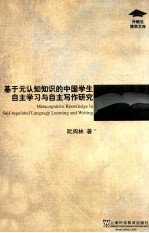
- 作 者:阮周林编
- 出 版 社:上海:上海外语教育出版社
- 出版年份:2012
- ISBN:9787544625586
- 标注页数:354 页
- PDF页数:370 页
请阅读订购服务说明与试读!
订购服务说明
1、本站所有的书默认都是PDF格式,该格式图书只能阅读和打印,不能再次编辑。
2、除分上下册或者多册的情况下,一般PDF页数一定要大于标注页数才建议下单购买。【本资源370 ≥354页】
图书下载及付费说明
1、所有的电子图书为PDF格式,支持电脑、手机、平板等各类电子设备阅读;可以任意拷贝文件到不同的阅读设备里进行阅读。
2、电子图书在提交订单后一般半小时内处理完成,最晚48小时内处理完成。(非工作日购买会延迟)
3、所有的电子图书都是原书直接扫描方式制作而成。
Chapter 1 Introduction 1
1.1 Introduction 1
1.2 The Chinese ELT context 4
1.3 Aims and significance of the study 9
1.4 Organisation of the thesis 11
Chapter 2 Literature Review 13
2.1 Introduction 13
2.2 Autonomy in language learning 14
2.3 Metacognition 25
2.4 Research on writing and writing instruction 45
2.5 Summary of the literature review 63
Chapter 3 Research Design 64
3.1 Introduction 64
3.2 Research approaches to language learning in classrooms 65
3.3 Instrument design 69
3.4 Pedagogical design of the writing course 86
3.5 Data collection 96
3.6 Data analysis 100
3.7 Summary 114
Chapter 4 Knowledge and Beliefs about Self-regulated Language Learning 115
4.1 Introduction 115
4.2 Descriptive results of the questionnaire survey 116
4.3 Relationships between the subcategories of the person variable 126
4.4 Attributional factors in learning success 127
4.5 Inter-group differences in person,task and strategic variables 128
4.6 Summary of the chapter 134
Chapter 5 Person Knowledge 136
5.1 Introduction 136
5.2 Pre-course person knowledge about writing 137
5.3 Post-course person knowledge about writing 149
5.4 Key themes of pre-and post-course person knowledge 161
5.5 Developing trend of person knowledge:triangulation of the diaries 163
5.6 Participants'questionnaire results of the person variable in language learning 172
5.7 Summary of the chapter 181
Chapter 6 Task Knowledge and Strategic Knowledge 183
6.1 Introduction 183
6.2 Pre-course task knowledge about writing 184
6.3 Post-course task knowledge about writing 193
6.4 Key themes of pre-and post-course task knowledge 201
6.5 Developing trend of task knowledge:triangulation of the diaries 204
6.6 Pre-course strategic knowledge 211
6.7 Post-course strategic knowledge 221
6.8 Key themes of pre-and post-course strategic knowledge 228
6.9 Developing trend of strategic knowledge:triangulation of the diaries 230
6.10 Participants'questionnaire results of task and strategic variables in language learning 236
6.11 Effects of the writing course on participants'writing performance 242
6.12 Summary of the chapter 243
Chapter 7 Case Studies 245
7.1 Introduction 245
7.2 Xue 246
7.3 Cheng 254
7.4 Zhang 263
7.5 Fang 269
7.6 Summary of the chapter 277
Chapter 8 Overall Discussion and Conclusions 279
8.1 Introduction 279
8.2 Revisiting the research goals 280
8.3 Summary of the research findings and discussion 283
8.4 The issue of sustainability 311
8.5 Theoretical model of metacognitive knowledge in language learning 313
8.6 Pedagogical principles of self-regulation in L2 writing 316
8.7 Evaluation ofthe research 321
8.8 Final conclusions and recommendations for future research 326
Bibliography 329
Appendices 346
